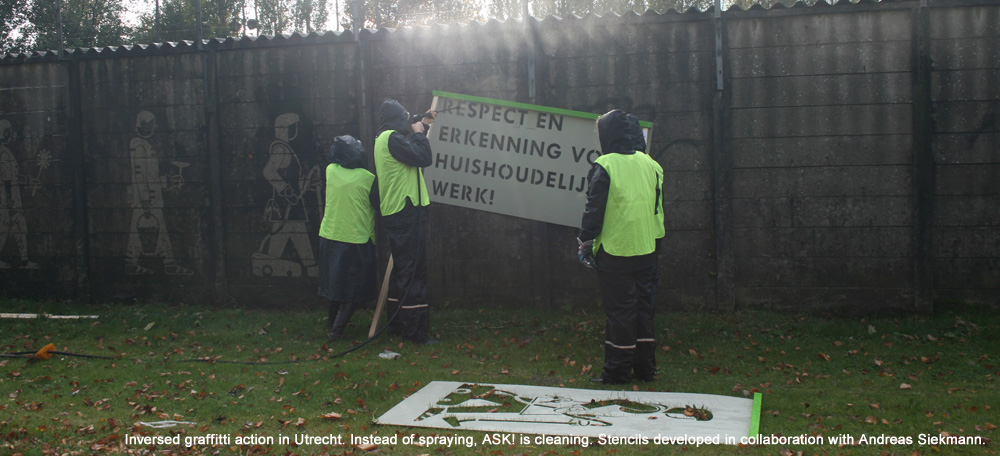“I think the artistic is like a double-edged sword.“
An Interview with Janna Graham, Nicolas Vass, and Annette Krauss by Laila Huber
Cultural worker Janna Graham (Centre for Possible Studies), artist Nicolas Vass (Precarious Workers Brigade), and artist, educator, and activist Annette Krauss (Utrecht/Vienna), were our guests at the “Artistic Interventions and Education as Critical Practice. (Un)learning Processes, Community Engagement and Solidarity” Symposium at the Program Area Contemporary Arts & Cultural Production in April 2014. In the interview with Laila Huber they talked about artistic interventions in relation to social movements, about creative skills, institutional critique, and the interweaving of activism, popular education, research and arts, and the undoing or unlearning of the artistic.*2 *(2)
Could you explain how you relate to the term artistic intervention in your practice? What do you understand by artistic intervention and is it a viable term for you?
Janna Graham: I have probably used the term “intervention” quite a lot over the past several years, but “artistic intervention” is something I have not thought about in a while. I remember using it a lot in the 1990s when speaking about institutional critique and artists intervening in collections. Thinking about the trajectory that I have taken from then, working with groups like Ultra-red, I have moved away from always characterizing or gauging interventions only in relation to art. As artists working within social movements this does not mean we stopped being artists necessarily, but that when working as and with organizers on projects of social justice, interventions are hybridized as both artistic and political and assessed and described according to other criteria and efficacies. So a lot of other terms complicate the artistic side of the intervention. In many social movement interventions with which I have been involved there has been a move away from artistic visibility, as a way to sidestep the authorial hierarchization process that often accompanies the naming of artists as exceptional to others. In the midst of the anti-cuts movement in the UK, for example, a number of people—artists and non-artists—formed the Precarious Workers Brigade and re-focused their work on the intersections between cultural politics and workers’ rights. When individual group members wanted to be recognized for their work as artists—I remember one circumstance when someone wanted to use an action as part of her course material for her Master of Fine Arts— it was a matter for significant debate. There were some people who felt that it would be fine because we all put work into activism at a time when we should be doing our “own work” (that is, our work to make a living). And at the same time, many felt it was inappropriate to put this work into the world of art or academia or to re-present it in any other kind of context. That word “artistic” often negates the collectivity of the process and also the fact that there are people in the process who do not identify as artists.
Nicolas Vass: There is something about the term artistic intervention that doesn’t really address where an intervention is, so it is like this abstract thing that could be applied to anything. And it presupposes that there is an idea that the artistic intervention will necessarily be better than any other type of intervention because it will be more creative, by virtue of being artistic, or it will be different or something like that.
Janna Graham: Yes, like the future-looking artistic avant-garde will come before the rest of the world’s interventions.
Nicolas Vass: So, I am a little bit suspicious of that because in some of the things that we have experienced in these past years, really creative ideas that could be deemed “artistic interventions” occurred in collective processes. A lot of people who don’t come from an artistic background came up with ideas for what was most relevant, so much to the point instead of theorizing about “how do we conceptualize a strike, how do we think about occupation within a museum?” People just said, “OK, we’ll do this, and this is how we plan it.”
Janna Graham, Nicolas Vass, Annette Krauss, Laila Huber ( 2014): “I think the artistic is like a double-edged sword.“. An Interview with Janna Graham, Nicolas Vass, and Annette Krauss by Laila Huber . In: p/art/icipate – Kultur aktiv gestalten # 05 , https://www.p-art-icipate.net/i-think-the-artistic-is-like-a-double-edged-sword/


 Artikel drucken
Artikel drucken Literaturverzeichnis
Literaturverzeichnis